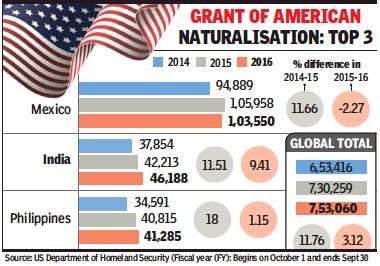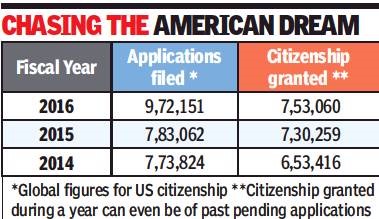46k desis got US citizenship in ’16, next only to Mexicans
Published in The Times of India on
9.4% Rise In 2016 Slower Than 11.5% In 2015
TIMES NEWS NETWORK
Mumbai: Nearly 46,200 odd Indians obtained US citizenship during 2016, making them the second largest group, even as Mexicans continued to top the chart. Indians accounted for 6% of the total citizenship conferred by the US government on 7.53 lakh individuals during the fiscal year 2016 (period between October 1, 2015 up to September 30, 2016), according to recent data released by the US Department of Homeland Security (DHS).
A slight year-on-year decline in the number of citizenships being granted is already visible, with immigration from Mexico showing a negative growth. As for Indians, the year on-year increase in citizenship in 2016 was 9.4% against 11.5% in 2015. Experts say those aspiring to become US citizens are now finding it tougher. There is an extreme vetting of applications and an uptake in denials on ‘odd’ grounds that date back many years. At the same time, uncertainty on work visa policies has spurred a significant spike in the number of applications. This has resulted in a huge processing backlog in administrative offices in the US. The DHS has provided aggregate data of the number of applications received over the years (a break-up based on country of origin is not available). With 9.72 lakh applications for US citizenship (or naturalization as it is referred to), fiscal year 2016 saw a rise of 24% over the previous year.
Indians more worried about denial than delay
 Comparatively, the 7.83 lakh applications in 2015 was only 1% higher than the number in 2014.
Comparatively, the 7.83 lakh applications in 2015 was only 1% higher than the number in 2014.
Normally only green card holders can opt for the naturalisation process. While a green card is a permit to live and work long term in the US, the flux in visa policies and the focus on more jobs for citizens is inducing many green card holders to opt for US citizenship.
“Indians, similar to other immigrants, now more than ever recognise the value of citizenship. A citizen has certain rights and protections—a fundamental right being that to vote. They also have additional job opportunities. Given the anti-immigrant rhetoric, immigrants are more aware of their need to be protected to the full extent possible,” explains John C. Yang, president and executive director of the non-profit organisation Asian Americans Advancing Justice | AAJC.
A report released in October by the National Partnership for New Americans (NPNA) states: The backlog of pending applications has increased by 77% over the past two years. At the end of June 2017, there were 7.08 lakh applicants for US citizenship waiting to be processed, up from 4 lakh applications at the same time two years earlier. The end result is a waiting time of over a year, in many US states, to be sworn in as a US citizen, whereas two years ago, it averaged around 6 months. NPNA is questioning whether this backlog is a deliberate process and is referring to it as a ‘second wall’. California, New York, Florida, and New Jersey, which are among the states with the highest backlog in their administrative offices, have a significant number of Indians.
David Nachman, managing partner, NPZ Law Group, attributes the delays in processing, to a lack of adequate resources, as the Trump administration has expanded the interview process to cover visas that earlier didn’t require such a process and the staff is stretched.
Denials also hit green card status
For many Indians, more than the delay, it is the denial of naturalisation that is worrying, as in some cases it can also impact the existing green card status. “We have concerns that applications have been unnecessarily subjected to inappropriate requests for follow-up information or investigations. Often, these involve family relationships or prior associations with employers. Some of these questions have gone back further in time than what we have seen before,” adds Yang. Rajiv Khanna, managing attorney at Immigration.com illustrates: In one case, an individual who held a green card for seven years was denied citizenship. The reason given by the authorities was that when they approved his green card, they were unaware that as an H-1B employee, he had worked at a location where he was not authorised. The US authorities went back eight years or more in the past to find a problem that could have then been easily curable.

